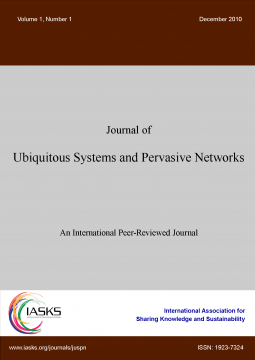volume-04-Issue 1 (2012)
Latest Articles
A Multimodal Transport Network Model for Advanced Traveler Information System
JUSPN, volume-04, Issue 1 (2012) , PP 21 - 27
Published: 04 May 2012
DOI: 10.5383/JUSPN.04.01.004
by Jianwei Zhang, Theo Arentze, Harry Timmermans from Eindhoven University of Technology, Eindhoven, The Netherlands, 5612AK
Abstract: There is an application need for seamless multimodal advanced traveler information systems. Currently, no comprehensive network modeling approach exists to deal with routing queries for different private and public transport modes taking into account multiple attributes, dynamic travel times and time tables in large-scale transport networks. The goal of this paper is to develop and test a generic multimodal transport network model for ATIS applications. First, we model multimodal transport networks from an abstract point of view and categorize networks into private and public modes. Then we use a generic method to construct a multimodal transport network representation by using transfer links which is inspired by the so-called supernetwork technique. Among all modes, pedestrian networks play an important role in modeling transfer connections. We test our model and algorithm based on a case study in the Eindhoven region. The results indicate that our model and algorithms provide a suitable basis for ATIS applications. One current limitation is that much time is required for data reading and compiling. This can be solved by implementing existing computational strategies to increase efficiency. read more... read less...
Keywords: Multimodal transport, traveler information system, route planning, supernetwork
The protection of privacy in the i-Tour framework
JUSPN, volume-04, Issue 1 (2012) , PP 15 - 20
Published: 04 May 2012
DOI: 10.5383/JUSPN.04.01.003
by Scott Cadzow from Cadzow Communications Consulting Ltd, Sawbridgeworth, England, UK CM21
Abstract: In this paper we describe the privacy concerns, risks and protection mechanisms within the i-Tour project. The role of legislation for privacy in Europe and other global sectors is examined to describe a privacy protection model that complies with the immediate target of European deployment but that also looks forward to the re-use of the approach across a wider global territory and technical deployment range. read more... read less...
Keywords: Security, Privacy, Regulation
Business potential and market opportunities of intelligent LBSs for personal mobility – A European case study
JUSPN, volume-04, Issue 1 (2012) , PP 9 - 14
Published: 04 May 2012
DOI: 10.5383/JUSPN.04.01.002
by Cristina d’Alessandro , Pier Carlo Trucco from Fondazione FORMIT, via G. Gemelli Careri, 11, Roma 00147, Italy FORMIT Servizi, Via C. Conti Rossini, 26, Roma 00147, Italy
Abstract: The article presents a first hypothesis of business models for an intelligent LBS for personal mobility. Two business models have been developed inside FP7 i-Tour project. i-Tour stands for “intelligent Transport system for Optimized Urban trips” and is a so-called Collaborative Focused Research Project presented to the call on Surface Sustainable Transport topic “SST.2008.3.1.2 Intelligent mobility systems and multi-modal interfaces for transport of passengers”. In order to develop business models for next generation personal mobility systems, an as-is analysis has been performed, resulting in a scenario characterized by the wide diffusion of wireless connections at urban and regional scale (e.g. UMTS, Wi-Fi or Wi-Max); by info-mobility services promoting multi-modal transport; by the development of transportation services based on localization technologies. The business models have been, then, proposed taking into account two different business strategies and two different organizations, and developing a financial analysis, including a break-even analysis useful to support a first feasibility study for a distinctive go-to-market strategy. read more... read less...
Keywords: Personalized multimodal travel information system, user-friendly, open standard, data collection, Location-based info, augmented reality, adding points of interest.
Ambient Intelligence on Personal Mobility Assistants for Sustainable Travel Choices
JUSPN, volume-04, Issue 1 (2012) , PP 1 - 7
Published: 04 May 2012
DOI: 10.5383/JUSPN.04.01.001
by Daniele Magliocchettia, Martin Gielowb, Federico Devigilia, Giuseppe Contia, Raffaele De Amicisa from Fondazione Graphitech, Trento, Italy, 38123 Faculty of Computer Science and Electrical Engineering , Rostock, Germany, 18059
Abstract: An increasing amount of attention is being paid by local public administrations, national and federal governments as well as by international institutions, such as the European Commission, to improve personal mobility within urban environments through the use of public transports. Improving mobility through increased use of public transportation is strategic to reduce energy consumption, to lower emissions and pollution levels, to improve public safety and to dramatically reduce congestions and road traffic. Reducing private transportation clearly brings significant benefits not only to citizens’ quality of life and public health but it also results in a more efficient urban system as a whole, with consequent substantial economic benefits at the wider societal level. At the same time, it is difficult to change human habits and people using public transports should have an efficient and user friendly way to access the best travel options suitable for their needs. Based on this assumption, this paper presents a prototype for an ambient intelligent urban personal mobility assistant, i.e. a software for smartphones and tablets which promotes use of public transport by helping user to identify the best travel option across a multi-modal transport network, through a user-friendly interface that intelligently adjusts to user preferences, and behavior. read more... read less...
Keywords: Personal Mobility Assistant, Intelligent Transportation System, Mobile Computing, User-Friendly mobile HCI, Pattern Recognition, Android OS

